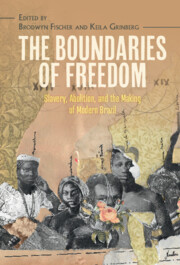Book contents
- The Boundaries of Freedom
- Afro-Latin America
- The Boundaries of Freedom
- Copyright page
- Contents
- Figures
- Tables
- Acknowledgments
- Introduction Slavery and Freedom in Nineteenth-Century Brazil
- Part I Law, Precarity, and Affective Economies during Brazil’s Slave Empire
- 1 The Crime of Illegal Enslavement and the Precariousness of Freedom in Nineteenth-Century Brazil
- 2 “Hellish Nurseries”
- 3 Agrarian Empires, Plantation Communities, and Slave Families in a Nineteenth-Century Brazilian Coffee Zone
- 4 Motherhood Silenced
- 5 The Abolition of Slavery and International Relations on the Southern Border of the Brazilian Empire, 1840–1865
- Part II Bounded Emancipations
- Part III Racial Silence and Black Intellectual Subjectivities
- Part IV Afterlives of Slavery, Afterwards of Abolition
- Bibliography
- Index
4 - Motherhood Silenced
Enslaved Wet Nurses in Nineteenth-Century Brazil
from Part I - Law, Precarity, and Affective Economies during Brazil’s Slave Empire
Published online by Cambridge University Press: 10 March 2022
- The Boundaries of Freedom
- Afro-Latin America
- The Boundaries of Freedom
- Copyright page
- Contents
- Figures
- Tables
- Acknowledgments
- Introduction Slavery and Freedom in Nineteenth-Century Brazil
- Part I Law, Precarity, and Affective Economies during Brazil’s Slave Empire
- 1 The Crime of Illegal Enslavement and the Precariousness of Freedom in Nineteenth-Century Brazil
- 2 “Hellish Nurseries”
- 3 Agrarian Empires, Plantation Communities, and Slave Families in a Nineteenth-Century Brazilian Coffee Zone
- 4 Motherhood Silenced
- 5 The Abolition of Slavery and International Relations on the Southern Border of the Brazilian Empire, 1840–1865
- Part II Bounded Emancipations
- Part III Racial Silence and Black Intellectual Subjectivities
- Part IV Afterlives of Slavery, Afterwards of Abolition
- Bibliography
- Index
Summary
This chapter contributes to debates about the relational dynamics of Brazilian slavery, focusing especially on enslaved wet nurses. While the relationships between masters and slaves in the private sphere did involve affection and loyalty, they were also gestated in an environment of abuse, humiliation, and physical and symbolic violence, all of which were essential features of slavery as an institution. Interactions that might be read initially as paradoxical or ambiguous were in fact constitutive of slavery’s ideology of domination, experienced and enacted in various ways by both masters and slaves. The figure of the wet nurse and the practice of relegating breastfeeding to enslaved women – which was generalized among Brazil’s dominant classes during the Empire – helped to forge a slavocratic habitus, a kind of second nature, in which future masters experienced the social relationships of slavery within their intimate circles and everyday lives from a very tender age. This chapter analyzes these domestic and extremely conflictual interactions as an integral part of the slave system, critical to the symbolic and social reproduction of Brazil’s master class.
Keywords
- Type
- Chapter
- Information
- The Boundaries of FreedomSlavery, Abolition, and the Making of Modern Brazil, pp. 108 - 127Publisher: Cambridge University PressPrint publication year: 2022
- 1
- Cited by



